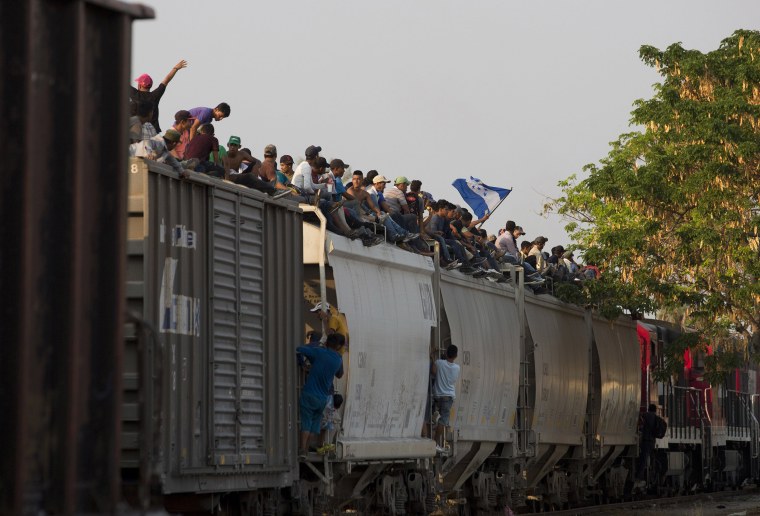The Trump administration intends to admit up to 15,000 refugees into the U.S. in the 2021 fiscal year down from a cap of 18,000.
Central American migrants ride atop a freight train during their journey toward the U.S.-Mexico border, in Ixtepec, Oaxaca State, Mexico, in April 2019. Moises Castillo / AP file
The Trump administration has proposed to further slash the number of refugees admitted to the United States in the coming fiscal year to a record low.
The administration intends to admit up to 15,000 refugees in the 2021 fiscal year, the State Department said in a statement late Wednesday.
That is 3,000 less than the 18,000 cap the United States set for the fiscal year of 2020, which was already the lowest number since the start of the U.S. Refugee Admissions Program.
New U.S. citizen Jad “Jay” Jawad, owner of the Crepe House Cafe, who came to the U.S. as a refugee from war-torn Iraq, in September in Phoenix.Ross D. Franklin / AP file
The president’s proposal “reflects the Administration’s continuing commitment to prioritize the safety and well-being of Americans, especially in light of the ongoing Covid-19 pandemic,” the state department said in the statement.
This year’s proposed refugee resettlement program includes specific allocations for people who have suffered or fear persecution on the basis of religion; for Iraqis; for refugees from El Salvador, Guatemala, and Honduras; and for refugees from Hong Kong, Cuba, and Venezuela, according to the state department.
The proposal will now be reviewed by Congress, where there are strong objections to the cuts, but lawmakers will be largely powerless to force changes.
Download the NBC News app for breaking news and politics
President Donald Trump suspended new refugee admissions in March amid the coronavirus pandemic, but some of those who were already part-way through the process were able to continue their applications.
Data for the 2020 fiscal year shows that the U.S. resettled around 11,800 refugees out of the 18,000 limit. It remains unclear if that is the final total for the fiscal year.
In comparison, nearly 85,000 refugees were resettled in the U.S. in the last year of the Obama administration.
Secretary of State Mike Pompeo insisted Wednesday that the U.S. remains the most generous nation in the world when it came to alleviating the refugee crisis.
“We continue to be the single greatest contributor to the relief of humanitarian crisis all around the world and we will continue to do so,” Pompeo said during a visit to Rome, stepping in to address a question from the press directed at Italian Foreign Minister Luigi Di Maio. “Certainly so long as President Trump is in office I can promise you this administration is deeply committed to that.”
There were at least 79.5 million people around the world who were forced to flee their homes at the end of 2019, including 26 million refugees, 45.7 million internally displaced people, and 4.2 million asylum-seekers, according to the United Nations Refugee Agency.
That represents more than one percent of the global population, the U.N. said.
In June, the U.N. high commissioner for refugees, Filippo Grandi, said the coronavirus crisis had further exposed refugees’ vulnerabilities, stripping away their hope for a better future.
The Trump administration anticipates receiving more than 300,000 new refugees and asylum claims in the 2021 fiscal year, according to the State Department’s statement.
The president’s proposal accounts for the backlog in asylum cases by prioritizing those who are already in the country seeking humanitarian protection and for the arrival of refugees whose resettlement was delayed due to the coronavirus crisis, the state department said.
The state department said the U.S. was focused on ending conflicts that drive displacement in the first place and provided humanitarian assistance to protect and assist displaced people.
“In line with the U.S. National Security Strategy, we are working to assist refugees and other displaced people as close to their homes as possible,” the statement said.
Abigail Williams reported from Washington D.C., Saphora Smith reported from London.
The Associated Press contributed to this report.












